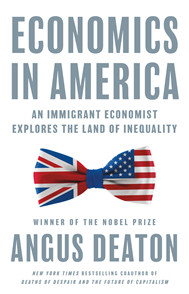
An Immigrant
Economist
Explores
the Land of
Inequality
Angus Deaton
Princeton University Press
Princeton, NJ,
2023, 280 pp.,
$24.95
Angus Deaton’s new book is based on his writings for a general audience over the years, organized around the theme of inequality in America. “With a constant eye on inequality,” he says, “I write about health care, pensions, the stock market, and poverty at home and abroad.” He shares his perspective as an immigrant economist who grew up in the Cambridge (England) tradition of economics before moving to the United States in the 1980s and winning the 2015 Nobel Prize, among other honors.
Deaton’s central concern is rising inequality: in incomes, a gulf between “elites” and the general population, and worsening social outcomes among those left behind by globalization, policy, and technological advancement—including rising mortality among less-educated workers, which Anne Case and Deaton described as “deaths of despair” in an earlier book. Deaton sees inadequate attention to climate change as a form of inequality because it neglects the welfare of future generations.
Deaton argues that the economics profession should widen the lens through which it views welfare, as Adam Smith intended, beyond income and wealth to encompass important aspects of human well-being such as meaningful work, family, and community. Economists should balance a tendency to focus on efficiency with more attention to equity, and should pay more attention to government’s potential to help address inequality.
On the appropriate role of public policy, the author emphasizes the importance of Kenneth Arrow’s notion that markets must be competitive—not merely “free”—to deliver socially acceptable outcomes. Absent competition, say because monopolies or monopsonies artificially raise prices or reduce wages, market outcomes can deliver results that consistently penalize certain segments of the population.
Deaton notes that in reality the adjustment to shocks is harder than policy discourse often assumes. He highlights educational and racial inequality as stark features of the social landscape. People displaced by global forces or technology often struggle to find work because of college degree requirements and the prohibitive cost of housing in large cities. Meanwhile, the social safety net is frayed, which means greater hardship for the relatively poor and less educated.
To address inequality, Deaton urges policymakers to focus not just on redistribution – which has conceptual and practical limits – but on “pre-distribution,” factors such as education and health that influence how markets determine the distribution of income before taxes and transfers. In some circumstances, higher minimum wages can boost low-income workers’ well-being without reducing employment.
Deaton sees a need for government intervention to reduce health care costs and poverty and to ensure more reliable retirement benefits. In the health care market, factors like asymmetric information about prices and procedures impede market competition. Overreliance on market forces in these circumstances, the author argues, leads to high health care inequality and prices, and low quality compared with other rich countries.
Deaton favors communal over individual financing and provision of pensions because market risks are high, most people lack the wherewithal to manage the risks, and for those who miscalculate risks or suffer bad luck the consequences are catastrophic. Deaton argues that governments should pay attention to poverty at home—as they have a particular obligation to their own citizens who pay taxes, work, and serve—and to poverty abroad, although he does not see aid as a durable solution.
The criticisms of economics may strike some as sweeping and overlook the intellectual and policy flexibility developed during and after the global financial crisis, including by the IMF under then-economic counselor Olivier Blanchard.
Overall, the book is informative, given the wide range of subjects; compelling, given Deaton’s obvious authority and rich experience; and, given his flair for writing, enjoyable.
Opinions expressed in articles and other materials are those of the authors; they do not necessarily reflect IMF policy.









